Key takeaways:
- Postpartum challenges include significant emotional and physical shifts, leading to feelings of isolation and anxiety for new mothers.
- Pro-life advocacy provides crucial support for expecting and new parents by fostering community connections and promoting maternal health policies.
- Seeking community support and sharing experiences with other mothers can alleviate feelings of isolation and offer practical help.
- Journaling and expressing emotions are beneficial coping strategies that aid in processing postpartum experiences and fostering resilience.
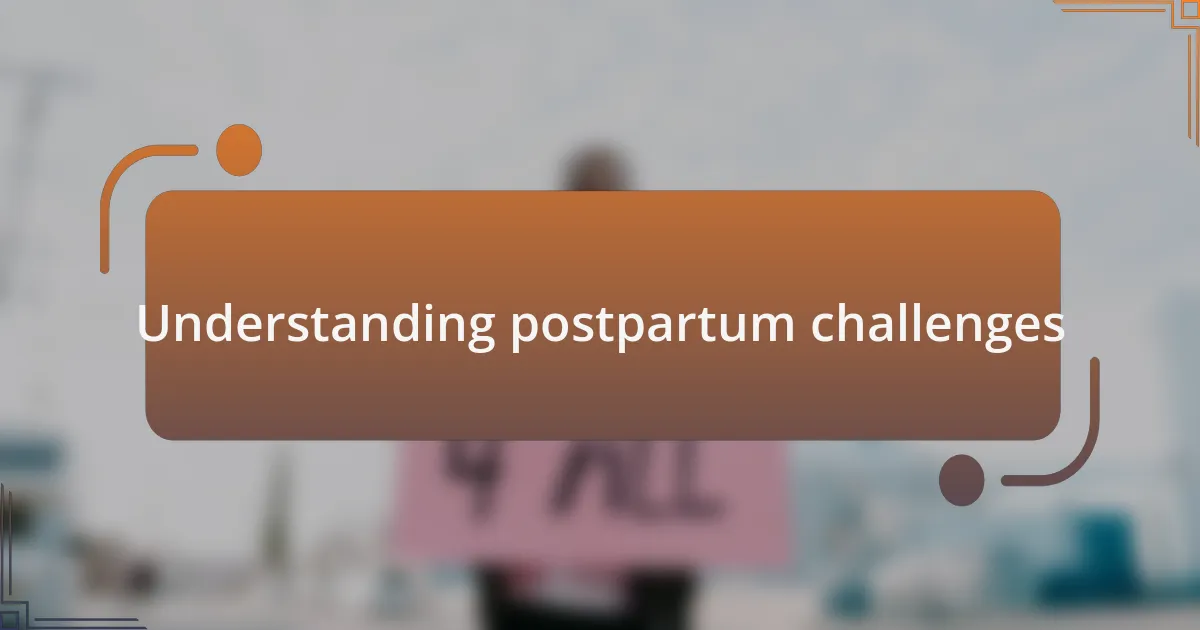
Understanding postpartum challenges
Postpartum challenges can feel overwhelming, often emerging suddenly after the joy of childbirth. I remember the first few weeks at home with my baby; it was a beautiful yet bewildering experience. How could something so precious often lead me to feel isolated and anxious?
In my experience, the emotional rollercoaster post-birth can be startling. One moment, I was filled with love and gratitude, and the next, I found myself crying for what seemed like no reason at all. I learned that hormonal shifts, combined with the pressure of caring for a new life, can create a perfect storm of emotional ups and downs. Have you ever felt like you were grappling with feelings you couldn’t quite name? I certainly did.
The physical changes I underwent were just as significant. The exhaustion from sleepless nights and the demands of breastfeeding took a toll on my body and spirit. I vividly recall looking in the mirror and struggling to recognize myself, both physically and emotionally. It made me think: how can we prepare for these changes when they are so often brushed aside? Understanding these dynamics is crucial; acknowledging them was one of the first steps I took toward healing.
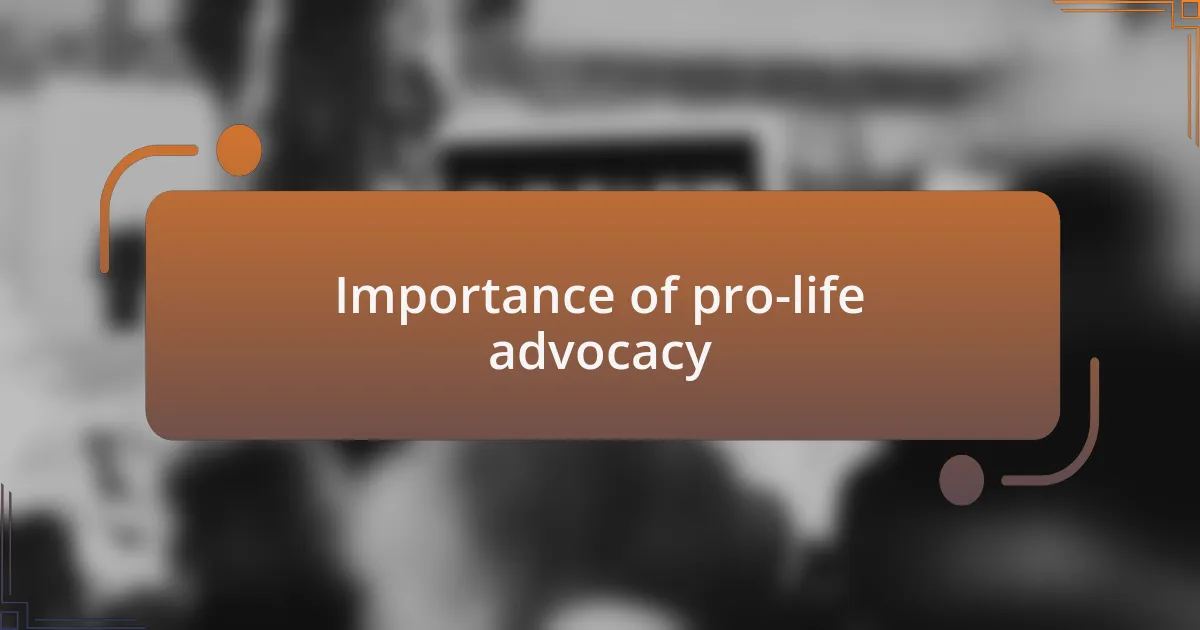
Importance of pro-life advocacy
The importance of pro-life advocacy cannot be overstated; it creates a supportive environment for expecting and new parents navigating the turbulent waters of postpartum challenges. In my early days of motherhood, I often found myself wishing for a community that understood the struggles I faced, both emotionally and physically. Isn’t it comforting to know that there are resources and advocates who genuinely care about the well-being of mothers and their children?
Pro-life advocacy emphasizes the value of every life, fostering a culture where every child and parent is supported. I vividly remember an advocacy group that held workshops for new mothers, focusing on mental health awareness and parental support. These gatherings not only provided me with valuable resources but also connected me with others who shared similar experiences. Reflecting on those moments, it’s clear that fostering these connections can empower parents and encourage them to seek help when needed.
Additionally, pro-life advocacy pushes for policies that protect both maternal and child health. Personally, I often felt overwhelmed by the complexities of healthcare access, especially in those first few postpartum months. Knowing that there are advocates fighting for better healthcare services for mothers made a significant difference in my outlook. How can we underestimate the power of advocating for policies that ensure every mother receives the attention and care she deserves? This drive for advocacy can create a more nurturing society where families can thrive.
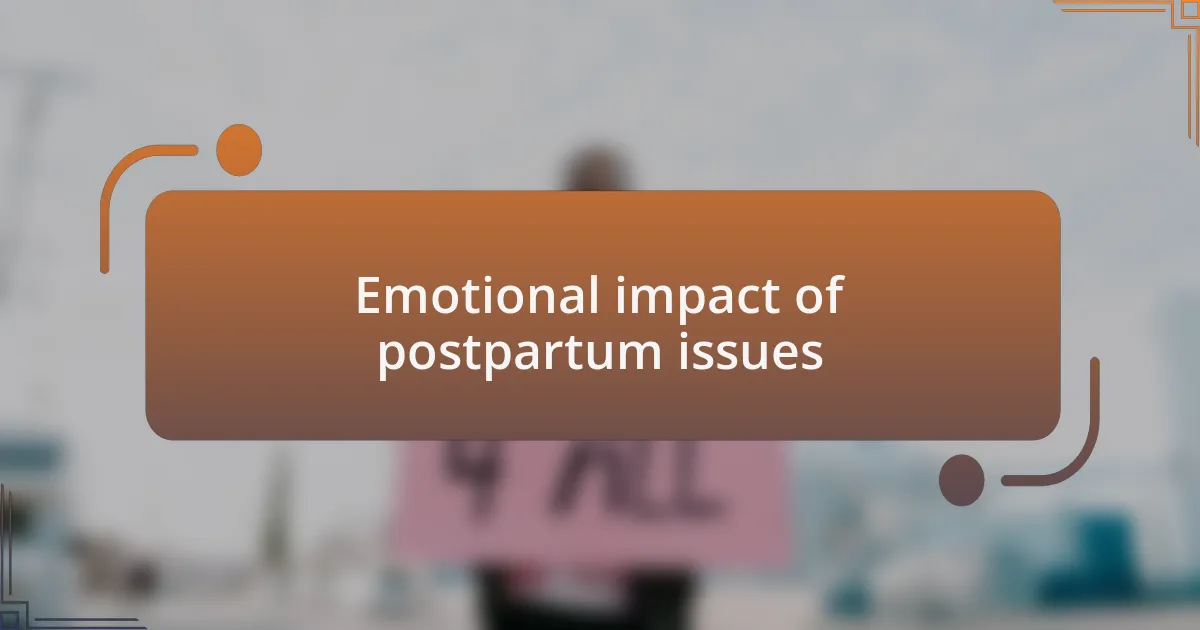
Emotional impact of postpartum issues
The emotional impact of postpartum issues can be profound. I remember sitting in silence, feeling an overwhelming sense of isolation as I grappled with my thoughts. It was as if the joy of motherhood was overshadowed by anxiety and sadness. Do you ever find yourself questioning whether you’re doing everything right? I certainly did, and in those moments of doubt, I realized that many mothers share this struggle.
Many new mothers experience what’s often referred to as the “baby blues,” but for some, it evolves into deeper challenges like postpartum depression. Reflecting on my journey, I recall days when simply getting out of bed felt like climbing a mountain. The weight of expectations—both from society and myself—pressed down heavily. It led me to wonder, why don’t we talk more openly about these struggles? Understanding that I wasn’t alone in these feelings was the turning point in my healing process.
In navigating these emotional hurdles, I found solace in expressing my feelings, whether in journaling or talking to others. These outlets transformed my experience from one of solitude to one of shared connection. I began to ask, what are healthier ways to cope with these emotions? And I discovered that small actions, like reaching out for support, could significantly lighten my emotional load. It’s a journey, and realizing that each step, no matter how small, was part of a broader healing process was instrumental for me.
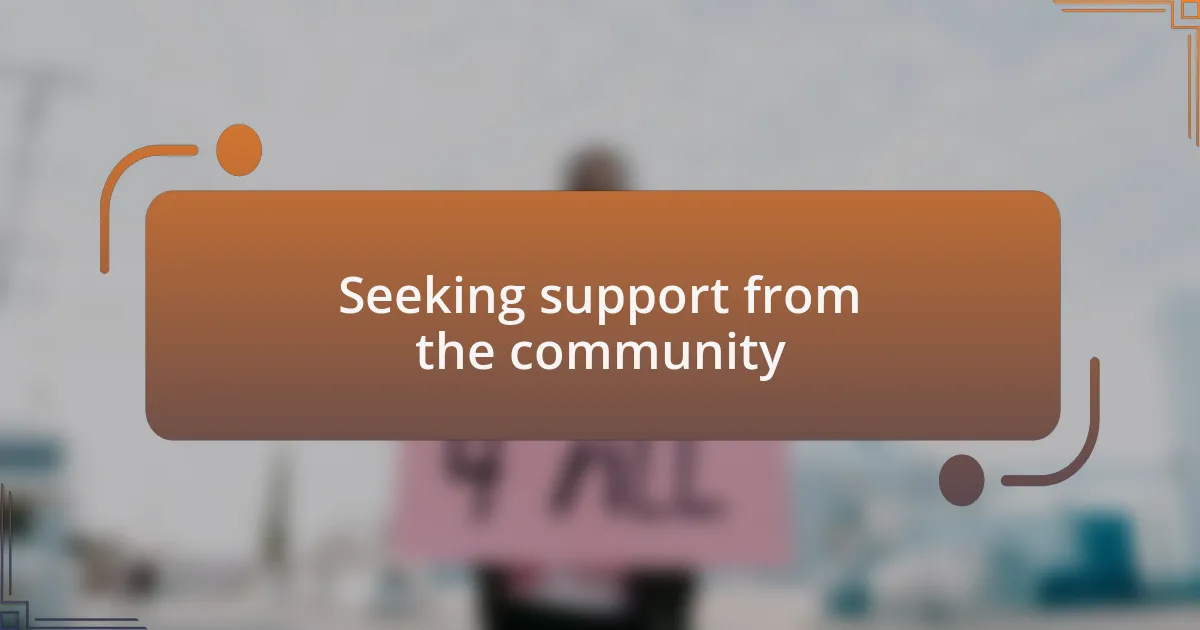
Seeking support from the community
Finding support within the community can be a game-changer when it comes to postpartum challenges. I vividly remember the moment I hesitated to join a local mothers’ group. My anxiety screamed at me to stay hidden away, but the curiosity about shared experiences nudged me forward. That gathering transformed my perception; I discovered that others were wrestling with the same feelings of isolation and confusion. Have you ever felt that sense of relief when you realize you’re not the only one struggling?
As I began to open up, I found a network of women ready to listen and share strategies. One mother mentioned how her neighbor brought over meals, something I never thought of asking for. It struck me: sometimes, support is about practical help as much as emotional connection. Why do we often hesitate to ask for these small yet meaningful acts of kindness? Learning to accept assistance became a vital part of my journey.
Community support also extends beyond fellow mothers. I started attending workshops on mental health and parenting, which equipped me with tools to navigate the complexities of new motherhood. I realized that seeking knowledge is just as important as seeking emotional support. When I leaned into these resources, the anxiety began to lift, and I felt empowered. Have you explored the wealth of resources available in your community? It’s incredible how the right support can bring light to even the darkest of days.
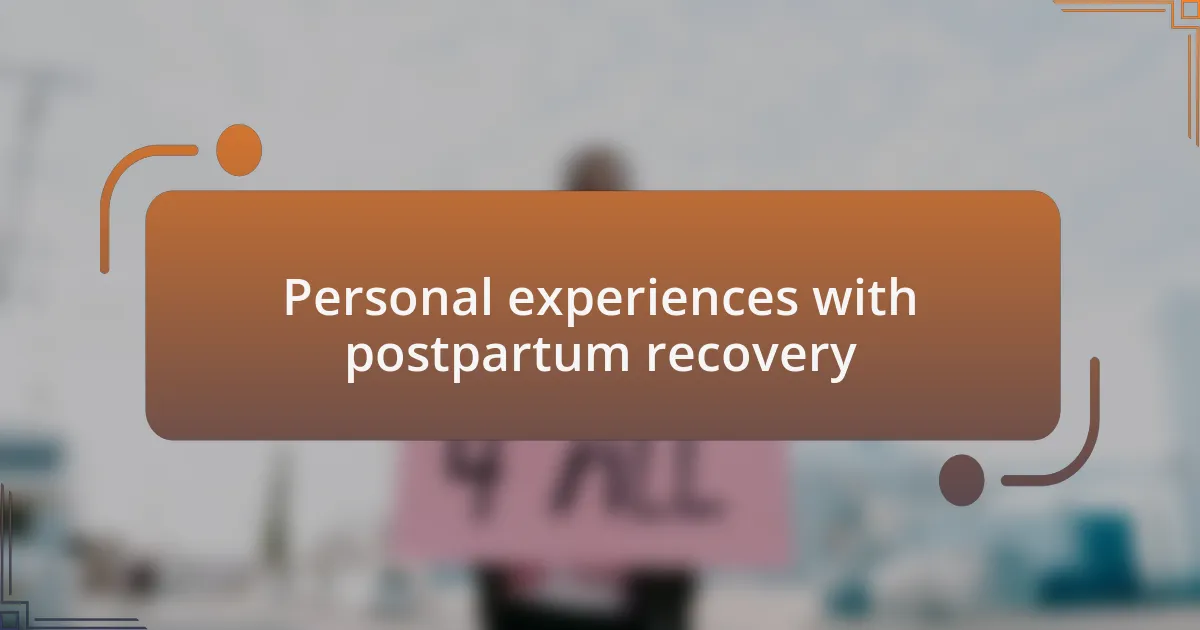
Personal experiences with postpartum recovery
Reflecting on my own postpartum recovery, I encountered a whirlwind of emotions. I remember days when getting out of bed felt like an insurmountable task. The exhaustion was profound, not just from sleepless nights, but from navigating the emotional ups and downs. Have you ever felt like you’re on a roller coaster where the highs are fleeting and the lows seem endless? That feeling of being overwhelmed was all too real for me.
There were moments that stood out—like sitting on the floor with my baby, surrounded by a sea of laundry I couldn’t muster the energy to tackle. I found solace in those quiet times, where I surrendered to the experience of simply being present. What I discovered was that these seemingly mundane moments often held the most healing power. I learned to embrace the silence, to breathe, and to know that it was okay to take a step back from the chaos.
As I gradually regained my strength, journaling became my outlet. Pouring my thoughts onto paper allowed me to process my feelings, turning confusion into clarity. I can’t emphasize enough how writing about my experiences helped me articulate fears that had previously felt too heavy to bear. Have you ever tried documenting your journey? It can be a liberating way to understand oneself better and foster resilience during those challenging times.